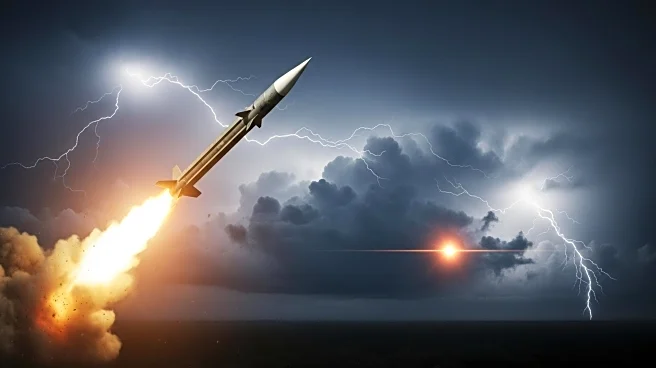What is the story about?
What's Happening?
Israeli airstrikes hit Yemen's capital, Sanaa, following missile attacks by Iranian-backed Houthi rebels towards Israel. The strikes targeted key infrastructure, including an oil facility and a power plant, resulting in at least six deaths and 86 injuries, according to the Houthi-run health ministry. The Houthis have been launching missiles and drones towards Israel, claiming solidarity with Palestinians amid the Gaza conflict. The Israeli military described the recent Houthi missile as a cluster bomb, marking a new threat. The strikes are part of ongoing tensions, with Israel responding to Houthi attacks that have disrupted shipping in the Red Sea.
Why It's Important?
The escalation between Israel and the Houthi rebels in Yemen highlights the broader regional conflict involving Iran and its proxies. The use of cluster bombs by the Houthis represents a significant technological advancement, likely supported by Iran, increasing the threat level to Israel. The conflict affects global shipping routes through the Red Sea, impacting international trade. The situation underscores the complex geopolitical dynamics in the Middle East, with implications for U.S. foreign policy and regional stability. The ongoing hostilities could lead to further military engagements, affecting civilian populations and international relations.
What's Next?
The Israeli military may continue its airstrike campaign against Houthi targets in Yemen, aiming to deter further missile attacks. The Houthis have vowed to persist in their operations against Israel, potentially leading to more confrontations. International stakeholders, including the U.S., may seek diplomatic solutions to de-escalate tensions. The conflict could prompt discussions on regional security and the role of Iran in supporting proxy groups. Humanitarian concerns may rise as civilian casualties increase, necessitating international aid and intervention.
Beyond the Headlines
The conflict raises ethical questions about the use of cluster bombs and their impact on civilian populations. The involvement of Iran in supporting the Houthis highlights the proxy warfare strategy in the region, affecting long-term peace prospects. The situation may influence U.S. policy decisions regarding arms sales and military support to allies in the Middle East. The humanitarian impact on Yemen, already suffering from a prolonged civil war, could exacerbate the crisis, leading to calls for international intervention.














